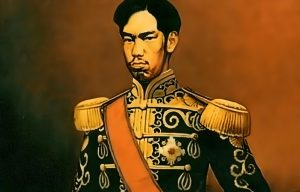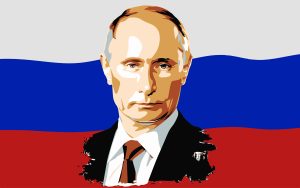“Happy is he who entrusts all his convictions of his literary life to a single government, or who relies on the teachings of a single newspaper. However, the sustenance of a critical spirit is always based on historical research. Our age is one that forces obedience in place of the spirit of criticism. The Meiji period was an era of strong instruction. However, his guidance was not carried out with contempt for the people…”
— Yojūrō Yasuda, “The Spirit of Meiji”
I am by no means an expert on political matters, and I make no claims of any particular expertise regarding current events. However, I have always taken a keen interest in history, and certain patterns are unmistakable. Namely, America as a country functions as an international bully, to put the matter in terms that are admittedly overly simplistic and perhaps somewhat bombastic. But the fact remains that this premise is difficult to argue against. Naturally, then, someone must stand up to this bully, but terrifyingly few seem to be willing or able to do so. Moreover, few seem to see the necessity for such actions. Most civilized nations have fallen to American propaganda; indeed, from its inception, America has run on propaganda, initially styling herself as the dauntless underdog, a gallant little nation struggling beneath the might and cruelty of her mother country. The founders of America were the initial pamphleteers, as it were. Then, following the Second World War, America styled herself as the upright and noble defender of freedom, a star-spangled image that the country retains to this day. Democracy is portrayed and often viewed as an unquestionable, unalloyed good, both beneficial to all and sought after by all, regardless of the suitability of democracy to the particular culture in question. This belies a severe lack of self-awareness as well as an intensely chauvinistic, parochial nature. But first of all, this American democracy is a lie, yet another myth, a flimsy veneer of utopia concealing the basest corruption imaginable. If the results of an election do not satisfy the class that I will call the professional advocates, the results are deemed fraudulent, the result of an international conspiracy, and, ironically, anyone who questions them is denounced as a conspiracy theorist. This is nothing if not rule by media, by these perpetually aggrieved professional agitators. American democracy represents the worst aspects of both communism and capitalism. At the infamous Tokyo trials, the writer and translator Shūmei Ōkawa humorously described it as “demo-crazy.”
But why, precisely, is American-style democracy necessary or desirable, even before having reached such excesses? What are its benefits that they so garishly tout, those natural salesmen? I have asked this question of several acquaintances, and the replies were all vague, and at times faintly reminiscent of far more leftist sentiments than these people would otherwise espouse, variations on “Power in the hands of the people.” These jingoists speak only in the most convoluted platitudes. How is it that no one has seen the need to stand up to these hollow men? Perhaps much of this is due to simple cowardice. American intimidation is a frightful thing.
In this modern era, I can think of only one national leader who has boldly done so, repeatedly ignoring President Joe Biden’s numerous empty threats and vague insults. Of course, my opinion will be a controversial one, but this man is none other than Vladimir Putin. In my humble estimation, this great man is a modern Meiji. I make the comparison to the Meiji Emperor, Mutsuhito, for a very deliberate and specific reason. “The spirit of the Meiji era was a mind toward the world that emerged from within,” Yojūrō Yasuda wrote in “The Spirit of Meiji.” Japan was opened to the West at gunpoint. The nation, ancient as it was, had no say in the matter; swords and rifles were no match for ship’s cannons. Despite this, Japan continues to retain a singularly elegant Japanese nature. After the scourge of Commodore Matthew Perry’s gunboats, the famous “black ships” that menaced a small island, Meiji had no choice but to modernize his nation at breakneck speed. In a matter of decades, Japan absorbed centuries of Enlightenment thought. “They knew Japan as history and believed in the Japanese people, and they knew how to raise Japan to the level of the modern nations with great determination,” wrote Yasuda. Emissaries were sent from Japan to various countries to absorb various aspects of modernity and subsequently return to Japan and adapt them to Japanese society. Sōseki Natsume, for example, was sent to London to learn “English literature,” and he became Japan’s greatest novelist upon his return, although he suffered from a nervous breakdown in the process. Sōseki’s experience was not unheard of; the surgeon Ōgai Mori, sent to Germany, underwent similar hardship. But, as Yasuda wrote, “Our Meiji lineage did not lose the guiding spirit that scholars of literature should possess.”

The Meiji Emperor
By the time of Meiji’s death, however, Japan appeared to be a thoroughly modern nation, with a tremendous capacity for self-defense, girded by her own history, culture, and tradition. “It was a true expression of the Japanese aesthetic, which prided itself on the fact that the spirit of Japan could be transmitted from soul to soul,” wrote Yasuda. Later in the piece, he elaborated, “The spirit of the samurai was more than artistic instruction, it was a strong legislator’s spirit of judgment and creativity. Traditions passed down through generations of feudalism rose in deep amplitude on the day we first discovered the world. In this, the spirit of the Meiji era in the arts and literature united the best of the Japanese aesthetic and literati spirit of generations. They were aware of the need to express their fortitude in all its glory. This was indeed the great transformation that the spirit of Japanese literature and art found in the name of Meiji. It was the sad strength of those who were late.”
In Russia, especially in history, art, and literature, one can easily sense a similar strength of spirit and character. Russia, too, retains a singularly Russian identity, despite the inescapable auspices of modernity. Russia is not presently being menaced by American gunboats, of course, and I am grateful that such a thing is unlikely to occur. One could even say that Russia has successfully repelled the American enemy thus far. Of course, I cannot speak from a Russian perspective, but speaking from a Japanese nationalist perspective, this is what I have observed. There are no black ships poised to devastate a nation far smaller and thoroughly unequipped to vanquish this unprecedented foreign threat. But America has assaulted the world with a vast and inescapable media blitzkrieg campaign, the likes of which the world has never seen. One could argue that the entire Anglosphere fell. Britain fell. Australia fell even harder. One could easily describe this as a form of mesmerism. Much of the world bows before the American behemoth, beholden to its sacred values of diversity, equity, inclusion, and of course the most recent, “safety.” They live in denial of the beautiful, the noble, and the sublime. Greatness is offensive to American sensibilities. Even their religion is diluted. This seems to be, at least in part, they reason they so detest Vladimir Putin, demonizing him as a tyrant. But it is America that is ruled by a debauched and incompetent bureaucracy. What does such a state of affairs resemble but the late stages of Leninism? Indeed, President Joe Biden, especially, resembles Lenin in his final years, a feeble old man propped up as the head of state, not so much elected as installed. There is no nation in the West that will say this. It would be overly charitable for me to compare this situation to “The Emperor’s New Clothes” – that everyone can see that the emperor is naked, but for fear of punishment, everyone remains silent, complimenting him on his beautiful clothes. But it seems that world leaders truly do see magnificent clothes where there are none. These men and women truly believe it; hallucination has become reality. They have bought the lies to such a great extent that they have lost the capacity to see truth, and truth, itself, seems false. Vladimir Putin, however, stands up to this onslaught, ignoring the threats that the American media cannot even be bothered to veil. Joe Biden, a senile old man, is not to be taken seriously. He once insinuated that Russians have no souls. His bullets are, as it were, vaporware. This man, unworthy of respect, is in charge of a world superpower. Beside him is a vice president who was chosen explicitly due to her race and gender, a woman who can hardly elucidate a single coherent thought. They, and their supporters, are not to be taken seriously, and yet they are by so many. The present political situation is beyond satire.

To return to the greater point, America, which purportedly despises imperialism and empire, attempts to sell the prospect of democracy with the zeal of an evangelist. What is this but an expansion of something that could be called an American empire, unnamed as it may be? In a pamphlet dating from 1947 and circulated by the Japanese Ministry of Education under the occupying forces, General MacArthur’s postwar constitution is discussed. “The first idea underlying this Constitution is democracy. What exactly is democracy, by the way? You have probably heard this word in the past. If this is the basis of the new Constitution, you must know it clearly. Moreover, you must know it correctly.”
The pamphlet continues in a predictably patronizing manner: “…the best way to avoid errors is for everyone to fully discuss their own opinions before deciding on a matter based on the opinions of the majority. Then, the rest of the people should follow the opinions of the majority of the people. The way of democracy is to decide things based on the opinions of as many people as possible. The same is true for governing a country. It is not good to govern a country based on the opinions of a few people. It is best to rule the country based on the opinions of all the people. In other words, the whole nation should be ruled by the whole people – this is the way to rule a democracy.” Later, “Therefore, democracy means that all the people of the country rule the country. Deciding things based on the opinions of all the people is the most reliable way to avoid mistakes. Therefore, if you govern your country through democracy, you will be happy and your country will be prosperous.” The section ends on a rather collectivist note: “There is nothing more enjoyable than to have everyone working together to take care of the affairs of your own country. This is what democracy is all about.”
The word “democracy” here could easily be replaced with “communism,” in fact.
I have translated several wartime propaganda pieces by Japanese militarists, and this is far more unsubtle than any of them. In their telling, democracy is synonymous with freedom and independence. But what is democracy but the tyranny of the masses? The greatest salesman is always the victor; quality is irrelevant. Once again, they detest the superior. During the American occupation of Japan, for example, American forces abolished hereditary titles for all but the Imperial family. They forced the Emperor to renounce his divinity, which is still a great national trauma for many from the older generations. America, a nation with no hereditary titles or nobility, a nation founded by Puritans with no great religious traditions, fervently pushed its proletarian aesthetics on Japan as soon as it got the chance. There is little doubt in my mind that they would do such a thing to any nation with titled nobility if they were only given the chance; America seems to prefer to cut greatness down in the name of equality so that everyone can be equally mediocre. After two atomic bombs were dropped and Tokyo was leveled by firebombing, killing untold numbers of civilians, largely women, children, and the elderly, this was America’s punishment for Japan. But like Japan in the wake of the Meiji Restoration, while on the surface Japan modernized, within, the culture remained largely unshaken. America, a nation with little more than three centuries of history, could not destroy a nation with a true and deeply rooted culture, the nation that brought the world Bushido.

Nor will America defeat Russia. “If you can cut the people off from their history, then they can be easily persuaded,” Karl Marx famously wrote, and nowhere has this played out more intensely than in America. But like Japan, Russia has a beautiful and ancient culture. It is a land of faith, history, and tradition, all of which America conspicuously lacks. America has produced no Dostoevsky or Bulgakov, no Bolshoi ballet, and no great schools of art, literature, faith, or philosophy. It is this fierce strength of character that will prevent American domination. Beyond this, it is the leadership of Vladimir Putin. America so detests Russia, at least in part, because they cannot comprehend the prospect of a non-unipolar world. But why should all cultures in the world be governed in the same way? It is an irony that America claims to value so highly “rugged individualism.” Why is it that they believe democracy is suited for every culture and every nation? If I were to assert the claim that all nations should be governed by hereditary monarchy, I would be denounced as an extremist, a dangerous radical who should be deplatformed, and yet they make such absurd claims about their form of democracy. Not every nation desires to be ruled by the masses. It is, quite frankly, a childish way of viewing the world. “Everyone is fundamentally the same,” they contend, “everyone is equal.” But as I contend that not everyone is capable of flying a plane, or performing surgery, or composing poetry, nor is everyone capable of participating in governance. Frankly, not every voice should be heard. Not everyone should have a say in national discourse. That is not to say that people should be forcibly silenced. No dissident should be silenced, although these days, it is the mainstream progressives who consider themselves to be dissidents. I am not advocating censorship, of course; that is what my opponents advocate, with their heavy-handed use of the words “misinformation,” “disinformation,” and whatever jargon is presently fashionable among the self-appointed social elites. I am simply arguing against actively encouraging every mediocrity to take an interest in matters of national and international importance. I am arguing against emphatically providing platforms to those without the intellectual capacity to understand nuance and those who lack the mental fortitude to see blatant propaganda for what it is. They should be allowed to say their piece, banal and misinformed as it may be, but who benefits from an anonymous public shouting their opinions from the rafters? Such voices should not shape the discourse.
This mass public interest in politics is partially the reason for America’s extreme vilification of Russia: they took an interest because even women’s magazines aggressively promote following politics as if it were a soap opera, or a spectator sport. Most people should take very little interest in politics beyond the very local level. Politics should not be a hobby, a cheap, mass-produced product to be imported, exported, and consumed. And yet much of the world consumes this product with relish. Much as Japan is, for the most part, an exception, my prediction is that Russia will remain so, as well.
“Russia will not soon become, if it ever becomes, a second copy of the United States or England – where liberal values have deep historic roots,” said Vladimir Putin in ‘Russia at the Turn of the Millennium.’ He should be taken at his word.










While many of the views expressed in this article are frankly immature, the author does make a rather good point in stating most people should not take interest in politics beyond the local level. as for everything else, its blatantly rooted in classism and prejudice towards social groups who present differently than what the author deems “correct”. America has produced countless scholars, authors, artists, etc. who do truly encapsulate the spirit of Art, it’s just that they don’t fit the image of the male, cisgendered, heterosexual scholar. When one opens their mind to accepting the art that those who are by all standards completely different, their mental horizons open exponentially as well. My understanding of classical literature has only grown deeper the more I recognize the value of interpersonal differences.
Honestly, dear author, stick to translating Akutagawa on twitter. That’s what I follow you for- not some right wing crap loaded with buzzwords and incorrect assumptions about what words like tyranny and freedom and democracy mean.
This is one of the most perceptive and cogent pieces of writing I have ever encountered. It should somehow be more widely utilised as essential reading.